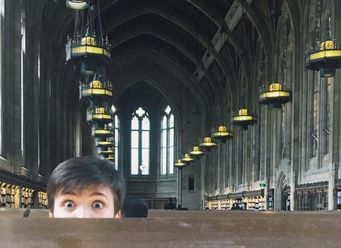Advice for New Students from Anna Mikkelborg '17 (Law, Societies & Justice w/College Honors)

Recent UW Honors grad Anna Mikkelborg is preparing to move to Oxford this fall to pursue her Master's (and then will go to Berkely for her PhD in political science). We asked Anna if she had any advice for incoming freshmen as she is contemplating the start of her own big transition.
"I've been thinking a lot about my freshman self lately, since starting at Oxford is giving me a new round of first-day-of-school jitters. As I recall, accepting and offering social invitations generously during the first few weeks of school served me really well — some people I never talked to again, but my roommates senior year were my dorm-mates in Haggett Hall, and my most recent hiking buddy is someone I met my very first day on campus."
Anna continued: "Academics-wise, I'd tell incoming freshmen not to take a class because they feel like they should take it — prerequisites aside — but to take charge of building their education. They should look into ad-hocing for Honors credits, work with their eventual major departments to arrange outside credit or independent studies, and, as upperclassmen, maybe take a graduate seminar or two from professors they know and admire. These strategies take some hustle, but they made my time at UW more challenging, exciting, and reflective of who I am than if I'd followed a path of lesser resistance."
From her experiences as an Interdisciplinary Honors undergrad Anna says she came to appreciate "the significance of the nexus between self and society in ways that both inform and transcend" her chosen field.
"My experience through Honors taught me not to be intimidated by tasks that seem overwhelming. I never would have read War and Peace, learned computer programming, or traveled across India without Honors challenging me to take on these adventures."
Anna's online Honors portfolio (which Interdisciplinary Honors students keep during all four years as undergrads) is packed with more details and reflections about those adventures.
Below are a few brief excerpts:
EXPERIENTIAL LEARNING/ROOTS Young Adult Shelter
While homelessness is clearly physically draining and even dangerous, I had not considered its emotional and psychological toll. I will never forget the third training session I attended: a young woman with her own history of homelessness was also there, and she got into a heated argument with our instructor over how to interact with homeless people.
She insisted that the people she had lived with on the street had been completely to blame for their situation. From what I had seen at ROOTS and learned in class, I knew this was not the case, but I realized then how easy it would be, told "no" by welfare agencies over and over, to start to believe that it was my own fault if I couldn't support myself.
I have parents who provide me with care that I have done nothing to earn; for young adults who for whatever reason don't have a caring family, there is no real institutional substitute. Consequently, while I am considered a useful member of society as a university student, people my age who may have worked far harder and struggled much more than I are stigmatized by society and ignored by passersby.
COURSES/Computer Science
My computer science classes were not immediately rewarding, but in retrospect, they taught me the invaluable art of troubleshooting. Checking through my work through the process of debugging and reaching out to find help on user forums were practices without parallels I'd needed to pursue in my other work.
WORK/William D. Ruckelshaus Center
I plan to pursue a career as a professor of political science, and this is a reality that will make my future work both more difficult and potentially far more impactful....Most significantly, I have learned to appreciate the complexity of navigating the confluence of theory and practice in policymaking.
Browse ANNA MIKKELBORG'S ONLINE HONORS PORTFOLIO